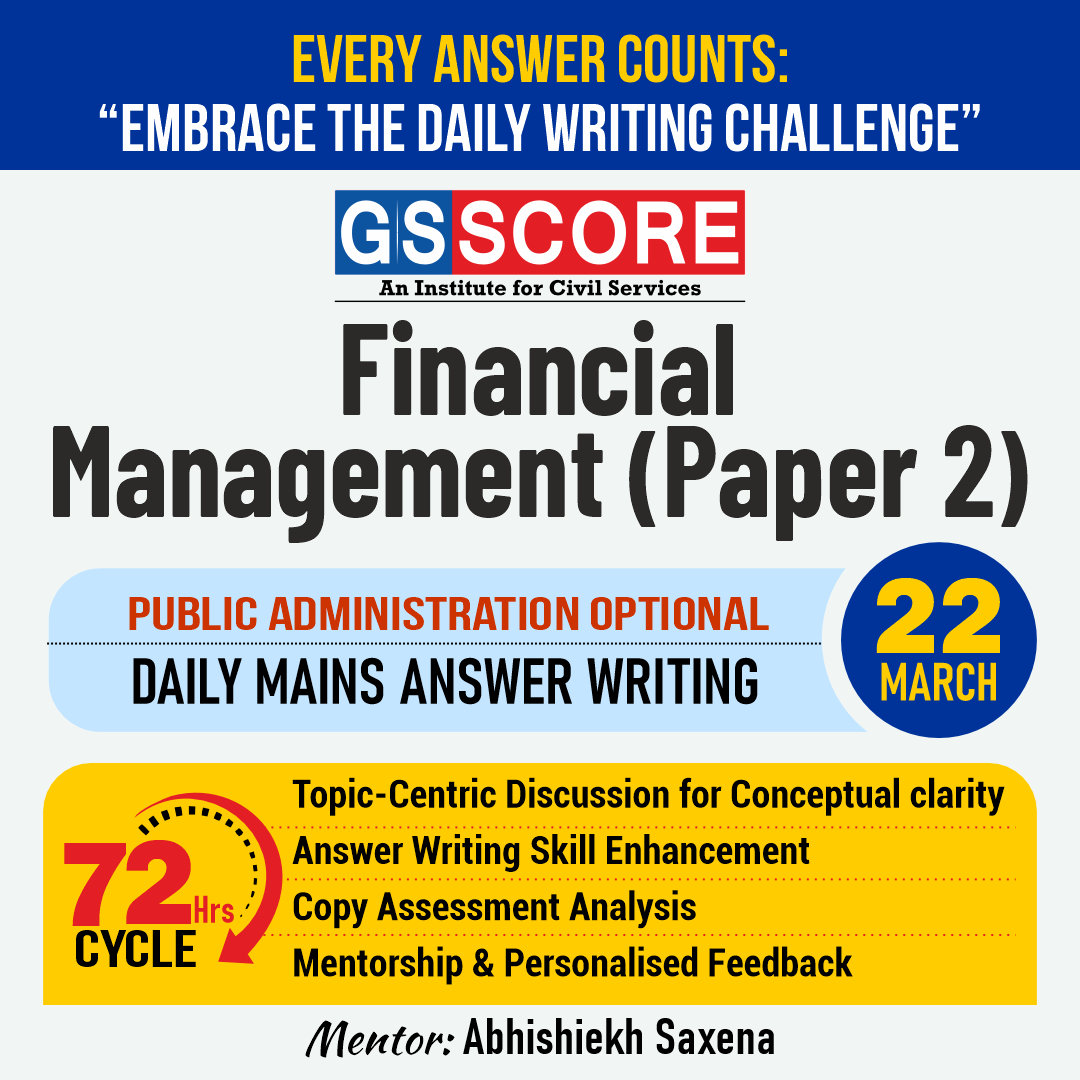


Instruction:
- There will be 2 questions carrying the First Question is-10 marks Write your answers in 150 words and the Second Question is-15 marks Write your answers in 250 words.
- Any page left blank in the answer-book must be crossed out clearly.
- Evaluated Copy will be re-uploaded on the same thread after 2 days of uploading the copy.
- Discussion of the question and one to one answer improvement session of evaluated copies will be conducted through Google Meet with concerned faculty. You will be informed via mail or SMS for the discussion.
Question #1. Performance Audit can only be performed if the project had been budgeted based on performance. Comment. 10 marks (150 words)
Question #2. What is a participatory budget? How it enriches democratic decentralization? 15 marks (250 words)
(Examiner will pay special attention to the candidate's grasp of his/her material, its relevance to the subject chosen, and to his/ her ability to think constructively and to present his/her ideas concisely, logically and effectively).
STEPS & INSTRUCTIONS for uploading the answers
Step 1 - The Question for the day is provided below these instructions. It will be available at 7:00 AM.
Step 2 - Uploading of Answers : Write the answer in A4 Sheet leaving proper margins for comments and feedback and upload the PDF in MY ACCOUNT section. Click on the option of SUBMIT COPY to upload the PDF.
Step 3 - Deadline for Uploading Answers: The students shall upload their answers by 7:00 PM in the evening same day. The first 50 copies will be evaluated.
Step 4 - Feedback : Mentors will give their feedback for the answers uploaded. For more personalised feedback, join our telegram channel by clicking on the link https://t.me/mains_answer_writing_cse . A one-to-one session will be conducted with the faculty after copy evaluation in 72 Hrs.
Model Answer
Question #1. Performance Audit can only be performed if the project had been budgeted based on performance. Comment. 10 marks (150 words)
Approach:
• Briefly about performance budgeting and auditing.
• Link the two, use examples.
• Conclude.
The efficiency and effectiveness of resource utilisation by the government is ensured by the tools of auditing and budgeting. Budgeting is the process of estimating the revenue and expenditure of the government.
Performance audit reviews management of an organization or program and whether it is achieving its objectives effectively, economically and efficiently. Sometimes called “Value for money” audits, they advise whether the value is received for the money being spent. The evolution of the utilisation of resources against the goal achieved.
Performance budgeting refers to the budgeting mechanism where financial resources are allocated by linking them to outputs. Strategies to achieve the desired outcomes and the unit cost of activities is also defined elaborately. It presents a comprehensive picture of what has been the result of the funds allocated.
Performance auditing can only take place when we know the inputs expected outputs, strategies used and unit cost of each activity. Which was laid down through the performance budget. In case of absence of such targets (or parameters) the evaluation of the policy or programmes is elusive. The Performance auditing is evolution of outcome which is only possible if the target is pre-defined through the performance budget.
Question #2. What is a participatory budget? How it enriches democratic decentralization? 15 marks (250 words)
Approach:
• Describe PB.
• Highlight its importance viz-a-viz democratic decntralisation.
• “Participatory Budgeting” is a concept that was pioneered in the Brazilian city of Porto Alegre in the mid-1980s. It is now practised in one form or other in thousands of cities around the world.
• Participatory budgeting (PB) is a process of democratic deliberation and decision-making, in which ordinary people decide how to allocate part of a municipal or public budget.
• More recently the MyCityMyBudget campaign, first launched in 2015, is gathering traction in Bengaluru, Mangaluru and Visakhapatnam, as a collaborative effort between respective city corporations and neighbourhood communities.
• In these cities, over 85,000 budget inputs have been crowdsourced from over 80,000 citizens in over 350 wards on a wide range of civic issues. These inputs will be reviewed and incorporated into the city budget.
Merits of Participative Budgeting
• First Step towards responsive governance: This is significant because in the government system, allocating budgets is the first step towards getting any piece of work done.
• Local Solutions: It facilitates a targeted, hyperlocal focus on budgeting and problem-solving.
• Enhances Political & Public Trust: It makes citizens feel like they have a voice in civic governance and thereby builds trust
• Improves Efficiency: It addresses inefficiencies arising from misplaced prioritisation of civic works relative to citizen needs.
• Increased Accountability: Finally, it improves accountability for civic works at the last mile (as citizens would monitor budget execution).
• Inclusive Governance: Children, women, senior citizens, the differently-abled and several interest groups would be able to make a case for their causes and aspirations in Municipal Budget through direct representations and have them fulfilled
• Helps in better maintenance of assets: This would foster far greater ownership in communities for civic assets and amenities, thereby resulting in better maintenance and upkeep. At the local level, it is a win-win for communities, elected councillors and the city administration.
• Strengthens Grassroots Democracy: Unlike the Union budget, the municipal budget is not just a financial or legal document. It can be an enabler of grass roots democracy in cities and tangible change for communities particularly children, women and the urban poor.
We need greater degrees of citizen engagement and media engagement on Municipal budgets for them to become instruments of real change at a street, neighbourhood and ward level.


